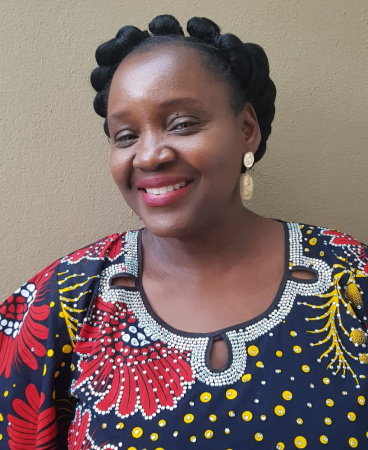FOR THE PAST TWO DECADES, the Africa Centre for HIV/Aids Management has equipped almost 5 000 students to manage HIV and Aids in the world of work.

As new statistics and knowledge come to light, the pandemic evolves and other health, environmental, macroeconomic and socioeconomic challenges arise, the centre needs to continually revise and expand its academic offering to ensure its continuous relevance. This shift in focus areas and priorities includes contracting specialists in relevant fields. The Africa Centre is therefore delighted to welcome well-published and accomplished researcher Dr Chioma Ohajunwa, who specialises in special education in an African context, to the lecturing team from 1 April 2023.
FOR THE PAST TWO DECADES, the Africa Centre for HIV/Aids Management has equipped almost 5 000 students to manage HIV and Aids in the world of work. As new statistics and knowledge come to light, the pandemic evolves and other health, environmental, macroeconomic and socioeconomic challenges arise, the centre needs to continually revise and expand its academic offering to ensure its continuous relevance. This shift in focus areas and priorities includes contracting specialists in relevant fields. The Africa Centre is therefore delighted to welcome well-published and accomplished researcher Dr Chioma Ohajunwa, who specialises in special education in an African context, to the lecturing team from 1 April 2023.

FOR THE PAST TWO DECADES, the Africa Centre for HIV/Aids Management has equipped almost 5 000 students to manage HIV and Aids in the world of work. As new statistics and knowledge come to light, the pandemic evolves and other health, environmental, macroeconomic and socioeconomic challenges arise, the centre needs to continually revise and expand its academic offering to ensure its continuous relevance. This shift in focus areas and priorities includes contracting specialists in relevant fields. The Africa Centre is therefore delighted to welcome well-published and accomplished researcher Dr Chioma Ohajunwa, who specialises in special education in an African context, to the lecturing team from 1 April 2023.

Local context and experience ensure relevance
While the Africa Centre has historically attracted students from across the globe, the unique challenges that Africa faces means the continent remains a key focus in the fight against HIV and Aids. In this regard, Dr Ohajunwa’s wealth of fieldwork and research conducted in the South African and broader African context is invaluable. She has worked with children and youth with intellectual disabilities in various communities in Africa and is a member of the boards of several Africa-based networks and communities focused on health, wellbeing and sustainable development. In addition, Dr Ohajunwa has contributed to several books (either as editor or author) about knowledge of and perspectives on health and sustainability in African communities.
Dr Ohajunwa currently works as a lecturer, course convener and online facilitator at the Centre for Disability and Rehabilitation Studies at the university, where she coordinated the master’s and postgraduate diploma course on disability policy analysis during her postdoctoral fellowship.
Strong links between spirituality and wellbeing in Africa
Dr Ohajunwa’s research interests – which include wellbeing and spirituality, inclusive policies, transculturality and indigenous knowledge systems – are closely intertwined with how HIV and Aids are viewed, discussed, treated and managed in Africa. She explains that, when it comes to exploring African indigenous communities’ understanding of health and wellbeing, it’s important to consider that one is not dealing with a homogenous context – communities and individuals engage with the concepts of health and wellbeing in different ways. However, one concept stands central: spirituality.
“Various scholars have made it evident that Africa is inherently spiritual. The African conceptualisation of health and wellbeing is very much influenced by the concept of our lived spirituality, which is different to the biomedical approach to health that we find in other global regions,” says Dr Ohajunwa.
All health conditions, including HIV and Aids, therefore represent an intersectional, multifaceted experience that requires an appropriate approach. This complexity, says Dr Ohajunwa, is one of the challenges that is critical to consider in developing and implementing effective policies.
United in the objective of successful policy implementation
According to Dr Munya Saruchera, interim director at the Africa Centre, Dr Ohajunwa’s involvement “will contribute significantly to the issue of inclusive health policy – beyond the management of only HIV and Aids – to which the centre is shifting its focus”.
Being a seasoned researcher who has been published in several local and international journals and collaborated with global institutions, including the World Bank, Dr Ohajunwa will play a significant role in enhancing students’ research skills and, as a result, their research outputs. As Dr Saruchera says, “Dr Ohajunwa will support our PgDip, MPhil and PhD students with qualitative research skills and training. In addition, she is full of compassion and empathy, and she brings the benefit of extensive international exposure and experience.” Her role will include supervising PhD and MPhil students, of which she has a successful track record, which will greatly enhance the centre’s academic supervision capacity.
Dr Saruchera is equally excited about the positive impact of Dr Ohajunwa’s vast network and host of national and international research projects on the centre’s research and publishing profile. In turn, Dr Ohajunwa is just as confident about the benefits of this partnership: “I look forward to being a part of and contributing to the future trajectory and vision of the centre.”
